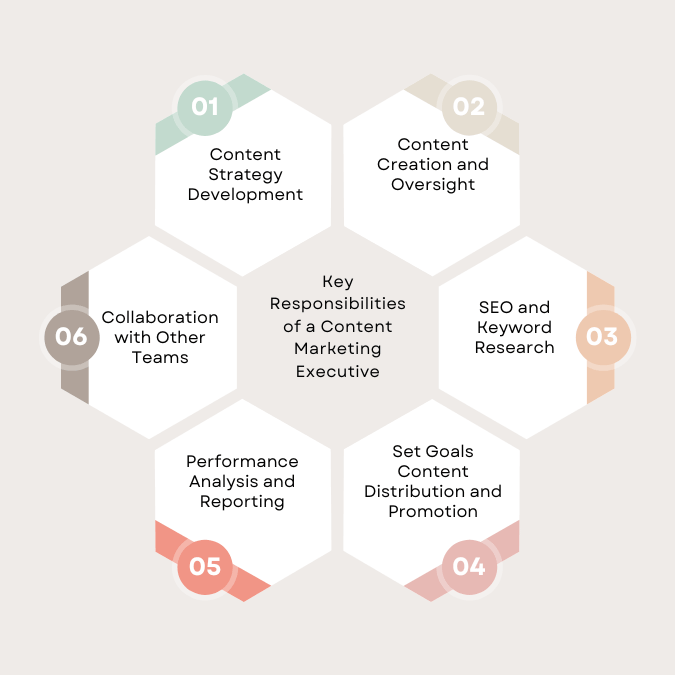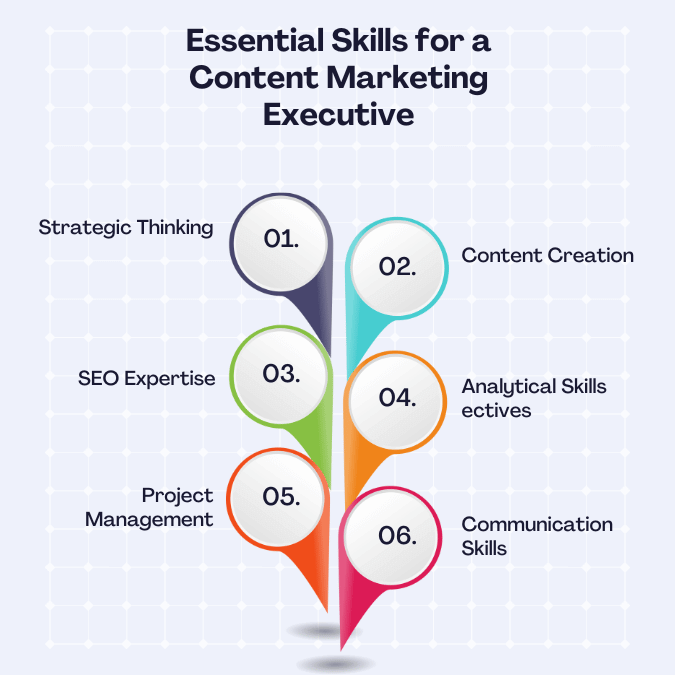Content marketing has become a cornerstone of successful digital marketing strategies. Companies are increasingly seeking professionals who can craft compelling content, manage campaigns, and drive brand engagement. A Content Marketing Executive plays a pivotal role in this landscape, acting as the bridge between a brand’s message and its target audience.
In this blog post, into the specifics of a Content Marketing Executive role, including key responsibilities, essential skills, and potential career growth. We’ll also provide real-world examples to help you understand the role better.
What Does a Content Marketing Executive Do?
A Content Marketing Executive is responsible for developing and executing a company’s content strategy. This involves creating content that aligns with the brand’s goals, engages the target audience, and drives measurable results. Unlike content creators who focus on producing content, It takes a strategic approach, ensuring that every piece of content serves a purpose within the larger marketing plan.
Key Responsibilities of a Content Marketing Executive

- Content Strategy Development
A Content Marketing Executive is tasked with crafting a comprehensive content strategy. This includes understanding the company’s objectives, researching the target audience, and identifying the types of content that will resonate most. For instance, a B2B company might prioritize white papers and case studies, while a B2C brand could focus on blog posts and social media content. - Content Creation and Oversight
While the executive may not write every piece of content, they oversee its creation. This could involve collaborating with writers, designers, and videographers to produce high-quality content. An example of this responsibility in action is when a Content Marketing Executive at an e-commerce company leads the creation of a holiday campaign, ensuring the content is consistent across emails, blogs, and social media. - SEO and Keyword Research
To ensure content ranks well on search engines, a Content Marketing Executive must be proficient in SEO. This includes conducting keyword research, optimizing on-page elements, and ensuring that content meets search engine guidelines. For example, by identifying high-traffic keywords like “sustainable fashion tips,” a Content Marketing Executive can guide the team to create content that attracts organic traffic. - Content Distribution and Promotion
Creating great content is only half the battle; getting it in front of the right audience is the other. A Content Marketing Executive is responsible for distributing content through appropriate channels, such as social media, email newsletters, and paid advertising. For example, after producing a new blog post, the executive may run a targeted social media campaign to increase its visibility. - Performance Analysis and Reporting
Measuring the success of content initiatives is critical. A Content Marketing Executive regularly analyzes content performance using tools like Google Analytics and SEMrush. They track metrics such as page views, engagement rates, and conversion rates, adjusting strategies as needed. For instance, if a series of educational videos generate high engagement, the executive might decide to allocate more resources to video content in the future. - Collaboration with Other Teams
Content marketing doesn’t happen in a vacuum. A Content Marketing Executive often works closely with other departments, such as sales, product, and customer service, to ensure content aligns with the company’s broader goals. For example, they might collaborate with the product team to create content that supports a new product launch, ensuring that the messaging is consistent and compelling.
Essential Skills for a Content Marketing Executive

To succeed in this role, a Content Marketing Executive needs a diverse skill set that includes both creative and analytical abilities. Here are the key skills required:
- Strategic Thinking
The ability to think strategically is crucial for a Content Marketing Executive. They need to see the bigger picture and understand how content fits into the overall marketing strategy. - Content Creation
While they may not be the primary content creators, Content Marketing Executives should have strong writing and editing skills. This allows them to create content when needed and ensure that all content meets quality standards. - SEO Expertise
A deep understanding of SEO is essential for driving organic traffic. This includes everything from keyword research to on-page optimization. - Analytical Skills
Content Marketing Executives must be comfortable analyzing data to measure the effectiveness of their content strategies. Tools like Google Analytics, SEMrush, and HubSpot are commonly used for this purpose. - Project Management
Managing multiple content projects simultaneously requires strong organizational and project management skills. Executives must be able to prioritize tasks, manage deadlines, and ensure that all content is delivered on time and within budget. - Communication Skills
Effective communication is key, as Content Marketing Executives often collaborate with various teams and stakeholders. They need to articulate their ideas clearly and ensure everyone is on the same page.
How to Become a Content Marketing Executive
If you’re interested in pursuing a career as a Content Marketing Executive, here’s a roadmap to get started:
- Education
A bachelor’s degree in marketing, communications, journalism, or a related field is often required. However, hands-on experience and a strong portfolio can also be valuable. - Gain Experience
Start by working in content creation roles, such as a content writer or editor. This will help you build the foundational skills needed for a Content Marketing Executive role. - Build a Portfolio
Showcase your best work in a portfolio, including examples of content strategies you’ve developed and the results you’ve achieved. - Learn SEO
Invest time in learning SEO best practices. Online courses and certifications can help you develop this essential skill. - Develop Analytical Skills
Familiarize yourself with analytics tools and learn how to interpret data to measure content performance. - Network
Join industry groups, attend conferences, and connect with other professionals in the field. Networking can open doors to job opportunities and provide valuable insights.
Conclusion
A Content Marketing Executive plays a pivotal role in shaping a brand’s voice and driving its content strategy. By understanding the responsibilities and skills required for this role, businesses can make informed hiring decisions, and aspiring content marketers can chart a path to success. Whether you’re looking to hire or be hired, this job description offers a roadmap to navigating the dynamic world of content marketing.
This detailed guide should serve as a valuable resource for anyone interested in the role of a Content Marketing Executive, providing both clarity and actionable insights.
